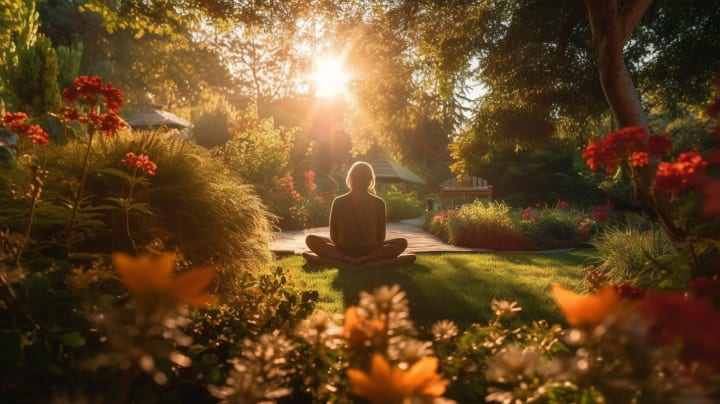
Introduction
In today's fast-paced and demanding world, finding inner peace and living a mindful life has become increasingly crucial. The practice of mindfulness, rooted in ancient wisdom, offers a transformative tool that can help us navigate the challenges of modern life. By cultivating mindfulness, we can bring a sense of calm, clarity, and contentment into our daily experiences. In this article, we will explore the profound power of mindfulness and provide you with seven life hacks that can help you cultivate peace and embrace mindful living.
What is Mindfulness?
Definition of Mindfulness
Mindfulness can be described as the art of being fully present in the present moment, without judgment. It involves directing our attention to our thoughts, emotions, and bodily sensations with an attitude of openness and curiosity. By practicing mindfulness, we learn to observe our experiences without getting entangled in them.
Benefits of Mindfulness
The benefits of mindfulness are truly remarkable. Research has shown that regular mindfulness practice can reduce stress, enhance focus and concentration, increase emotional resilience, and improve overall mental and physical well-being. By incorporating mindfulness into our lives, we can experience greater joy, peace, and fulfillment.
The Science Behind Mindfulness
How Mindfulness Affects the Brain
Neuroscience has provided fascinating insights into the impact of mindfulness on the brain. Regular practice of mindfulness can bring about structural and functional changes in the brain. Studies have revealed an increase in gray matter density in regions associated with attention and emotional regulation. Additionally, mindfulness activates the prefrontal cortex, responsible for decision-making and problem-solving, while simultaneously reducing the activity in the amygdala, the brain's fear center.
The Physical and Mental Health Benefits of Mindfulness
The benefits of mindfulness extend beyond the brain. Mindfulness has been found to alleviate symptoms of anxiety, depression, and chronic pain. It can also lower blood pressure, improve sleep quality, and strengthen the immune system. By embracing mindfulness, we can cultivate a healthier mind and body.
Life Hack #1: Start Your Day with Mindful Morning Rituals

Setting the Tone for a Mindful Day
The way we start our mornings sets the tone for the rest of the day. Incorporating mindful morning rituals can help us cultivate a peaceful and grounded mindset. Begin by dedicating a few moments to connect with your breath and set an intention for the day ahead. Engage in activities that promote mindfulness, such as gentle stretching, journaling, or enjoying a nourishing breakfast without distractions.
Morning Meditation Practices
Meditation is a powerful tool to cultivate mindfulness. Set aside a few minutes each morning to practice meditation. Find a quiet space, sit comfortably, and bring your attention to the present moment. Focus on your breath, the sensations in your body, or a chosen anchor such as a word or phrase. Allow thoughts to come and go without judgment, simply observing them. Meditation can help you cultivate a calm and centered mindset, ready to embrace the day with clarity and presence.
Life Hack #2: Cultivate Mindful Eating Habits

The Importance of Mindful Eating
In our fast-paced society, mealtimes are often rushed and consumed mindlessly. However, by bringing mindfulness to our eating habits, we can nourish both our bodies and our minds. Mindful eating involves savoring each bite, paying attention to the flavors, textures, and smells of the food, and chewing slowly. It encourages us to tune in to our body's signals of hunger and fullness, leading to healthier eating choices and a greater appreciation for the nourishment we receive.
Mindful Eating Techniques
To cultivate mindful eating habits, start by minimizing distractions during meals. Put away electronic devices and create a peaceful eating environment. Take a moment to observe your food, appreciating its colors and aromas. Chew each bite thoroughly, savoring the flavors and textures. Pay attention to your body's cues of hunger and satiety, eating until you feel comfortably satisfied. By practicing mindful eating, you can develop a deeper connection with your body and cultivate a healthier relationship with food.
Life Hack #3: Incorporate Mindfulness into Your Daily Routine

Mindful Breathing Exercises
One of the simplest ways to cultivate mindfulness throughout the day is through mindful breathing exercises. Take a few moments at regular intervals to focus on your breath. Close your eyes if possible, or simply soften your gaze. Bring your awareness to the sensation of your breath entering and leaving your body. Notice the rise and fall of your abdomen or the feeling of air passing through your nostrils. This simple practice can anchor you in the present moment, reducing stress and promoting a sense of calm.
Mindful Walking and Movement
Another powerful way to infuse mindfulness into your daily routine is through mindful walking or movement. Instead of rushing from one place to another, take the opportunity to be fully present during your walks or any form of physical activity. Pay attention to the sensations in your feet as they touch the ground, the movement of your body, and the surrounding environment. Engage your senses, noticing the sounds, sights, and smells around you. By embracing mindfulness in movement, you can transform everyday activities into opportunities for presence and gratitude.
Life Hack #4: Create a Mindful Environment

Declutter and Organize Your Space
Our external environment greatly influences our internal state. Creating a mindful environment begins with decluttering and organizing our physical space. Take time to declutter areas that feel chaotic or overwhelming. Clear out unnecessary possessions and create an organized and harmonious space. This process can bring a sense of calm and clarity to your surroundings, allowing you to cultivate peace within.
Mindful Home Decor and Feng Shui
Enhance your mindful environment by incorporating elements of nature and simplicity into your home decor. Choose natural materials, such as wood or plants, that bring a sense of serenity and grounding. Arrange furniture and objects with intention, considering the principles of feng shui or other harmonious design practices. By creating a mindful environment, you invite peace and tranquility into your daily life.
Life Hack #5: Practice Mindful Communication

Active Listening
Mindful communication is essential for cultivating harmonious relationships and deepening connections with others. One key aspect of mindful communication is active listening. When engaged in a conversation, give your full attention to the speaker. Avoid interrupting or preparing your response while they are speaking. Instead, focus on truly understanding their words, emotions, and intentions. Practice empathy and compassion, seeking to create a safe and supportive space for open dialogue.
Mindful Speaking
In addition to active listening, mindful speaking is equally important in fostering effective communication. Before speaking, take a moment to tune in to your own thoughts and emotions. Speak with intention, choosing your words carefully and consciously. Consider the impact of your words on others, cultivating kindness and respect in your communication. By practicing mindful communication, you can foster deeper connections and prevent unnecessary misunderstandings.
Life Hack #6: Embrace Mindful Technology Usage

Mindful Social Media Engagement
Technology has become an integral part of our lives, but it can also be a source of distraction and disconnection. To cultivate mindful technology usage, be intentional about how you engage with social media. Set boundaries and allocate specific times for checking your social media accounts. When using social media, be mindful of the content you consume and the emotions it evokes. Consider unfollowing accounts that create negativity or comparison. Engage with content that uplifts, educates, and inspires you.
Setting Boundaries with Technology
In addition to mindful social media engagement, setting boundaries with technology is crucial for cultivating a balanced and mindful life. Create designated technology-free zones or periods in your day, allowing yourself to disconnect and be fully present. Establish a bedtime routine that excludes screen time, promoting restful sleep. By consciously managing your technology usage, you can reclaim control over your time and focus on what truly matters.
Life Hack #7: Cultivate Gratitude and Mindful Living

Gratitude Journaling
Practicing gratitude is a powerful way to shift your focus from what is lacking to what is abundant in your life. Start a gratitude journal and make it a habit to write down three things you are grateful for each day. This simple practice can cultivate a mindset of appreciation and positivity. Reflecting on the good in your life can bring a sense of fulfillment and contentment.
Acts of Kindness and Mindful Giving
Embrace mindful living by engaging in acts of kindness and mindful giving. Look for opportunities to help others, whether through volunteering, donating, or simply offering a kind word or gesture. By shifting your focus outward and contributing to the well-being of others, you create a ripple effect of positivity and connection. Mindful giving allows you to experience the joy of making a difference in someone else's life.
Conclusion
Incorporating mindfulness into our lives has the power to transform our well-being and the way we experience the world. By implementing these seven life hacks, you can cultivate peace, presence, and mindful living. Embrace the power of mindfulness and watch as it brings you closer to a life filled with contentment, authenticity, and deep connections.
FAQs
Q: What are the benefits of mindfulness?
Mindfulness offers numerous benefits, including stress reduction, improved focus and concentration, increased emotional resilience, enhanced mental and physical well-being, and a greater sense of inner peace and contentment.
Q: How long does it take to see results from practicing mindfulness?
The effects of mindfulness can vary from person to person. Some individuals may experience immediate benefits, such as increased calmness and clarity, while for others, it may take consistent practice over time to notice significant changes in their well-being.
Q: Can mindfulness help reduce stress and anxiety?
Yes, mindfulness has been shown to be effective in reducing stress and anxiety. By cultivating present-moment awareness and adopting a non-judgmental attitude, mindfulness helps individuals better manage and respond to stressors in their lives.
Q: Is mindfulness suitable for everyone?
Mindfulness can be practiced by people of all ages and backgrounds. However, it is important to approach mindfulness with an open mind and consult a healthcare professional if you have any specific concerns or conditions.
Q: How can I incorporate mindfulness into a busy lifestyle?
Even with a busy lifestyle, it is possible to incorporate mindfulness into your daily routine. Start with small steps, such as taking a few mindful breaths throughout the day or engaging in brief moments of focused awareness during everyday activities. Gradually expand your practice as you see fit, finding moments of mindfulness amidst the busyness.





Comments
There are no comments for this story
Be the first to respond and start the conversation.